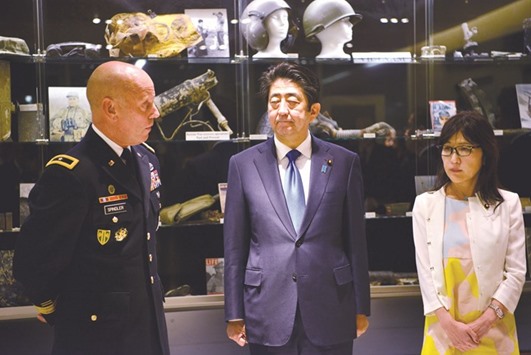Japanese Prime Minister Shinzo Abe travelled to Hawaii’s Pearl Harbor, the site of a sneak attack by his country that provoked America into entering World War II, to reinforce what the leader calls “the power of reconciliation.”
Abe, who is hosted by US President Barack Obama, would be the first Japanese premier to visit the wreckage of the USS Arizona, which lost 1,177 crew members to the Japanese attack 75 years ago. The meeting between the two leaders comes as Abe prepares to lead Japan into uncharted waters, after President-elect Donald Trump clouded the guiding stars of US-Japanese relations.
The President-elect has declared his opposition to the Trans-Pacific Partnership trade deal that Obama was pushing for and that Abe made the heart of his economic strategy. And, at least on the campaign trail, Trump has even called into question the US security guarantees that shielded Japan through the Cold War and later the rise of China.
In eight years, Obama — America’s Hawaiian-born first “Pacific president” — never made the headway he wanted in his vaunted “rebalance to Asia” diplomatic strategy. But he and Abe chose a telling spot to celebrate US-Japanese partnership, three-quarters of a century after the “day of infamy,” December 7, 1941.
In May, Obama visited Hiroshima to pay his respects, and yesterday Abe laid a wreath at the USS Arizona memorial. The leaders were expected to head by boat to the white-walled memorial positioned over the sunken vessel. The Japanese attack on an unsuspecting US fleet moored at Pearl Harbor turned the Pacific into a cauldron of conflict. The attack had been prepared in secret by Japan for months, but was over within two hours.
Post-war co-operation, however, has healed many wounds. Only five of the Arizona’s crewmen are still alive and, while the memorial remains a tourist draw, in Hawaii the divisions of war have given way to a shared present.
“Hawaii has a very multi-ethnic population with a very large Japanese population,” Stanley Chang, a 34-year-old Democratic member of the Hawaii state senate said. “I don’t think there is any feeling of antipathy towards the Japanese, 75 years after the attack.”
Today, Obama’s home state has a reputation as one of the most multi-ethnic and multi-cultural in the country.

US Army Brigadier General Spindler, left, is seen with Japanese Prime Minister Shinzo Abe, centre, and Japanese Defence Minister Tomomi Inada in Honolulu, Hawaii.
